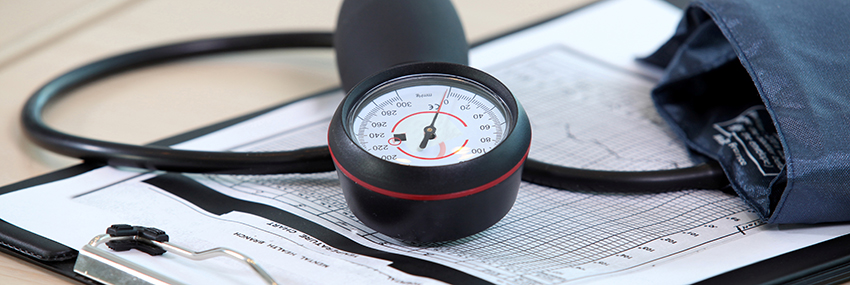
High Blood Pressure (Hypertension)
Hypertension is defined as “abnormally high blood pressure,” and therefore often referred to as high blood pressure.
According to the Centers for Disease Control and Prevention, 75 million American adults have high blood pressure, which breaks down to one in three adults. High blood pressure increases the risk for heart attack and stroke, which are among the leading causes of death in America. Simple lifestyle changes, medications and regular monitoring can help control your blood pressure and reduce these risks.
Symptoms
High blood pressure may develop over many years and has no signs or symptoms. Some may experience headaches, shortness of breath or nosebleeds, but these typically don’t occur until immediate medical treatment is needed.
Complications from High Blood Pressure
 Damage to your blood vessels and organs in your body can occur from long-term, excessive pressure against your artery walls. The higher your blood pressure and the longer it goes uncontrolled, the greater the damage, according to the Mayo Clinic.
Damage to your blood vessels and organs in your body can occur from long-term, excessive pressure against your artery walls. The higher your blood pressure and the longer it goes uncontrolled, the greater the damage, according to the Mayo Clinic.
Uncontrolled high blood pressure can lead to:
- Heart attack or stroke
- Aneurysm
- Heart failure
- Kidney disease -weakened and narrowed blood vessels in your kidneys can prevent them from functioning normally
- Vision loss - thickened, narrowed or torn blood vessels in the eyes
- Metabolic syndrome - includes a cluster of disorders of your body's metabolism that make you more likely to develop type 2 diabetes, heart disease and stroke -includes increased waist circumference; high cholesterol; high blood pressure; and high blood sugar levels
- Preeclampsia - severe, sudden high blood pressure in pregnant women may lead to low birth weight and eye or brain damage in the fetus
- Trouble with memory or understanding -uncontrolled high blood pressure may also affect your ability to think, remember and learn
Risk Factors
There are several risk factors that play into whether an individual will develop high blood pressure or not. Some of them are within a person’s control, others are not. Risk factors include:
- Family History
- Age - the older you are the more likely you are to get high blood pressure
- Gender (depending on age) –Until age 45 men are most likely; 45-64 men and women have similar rates, 65 and over women are more likely to develop high blood pressure
- Race - African Americans more than other people of any other racial background in the US and high blood pressure tends to occur at younger ages among African Americans
- Lack of physical activity
- Unhealthy diet, especially diets high in sodium
- Being overweight or obese
- Drinking too much alcohol
Detecting High Blood Pressure
Fortunately, high blood pressure is easy to detect. If you are unsure if you are at high risk for developing high blood pressure and other health complications, the American Heart Association provides a “Check. Change. Control. Calculator” to help you learn if you’re at risk for things like heart attack and stroke, or you can schedule a wellness check-up at the Center for Healthy Living on Purdue’s West Lafayette campus by calling 494-0111 or via the patient portal.
Managing High Blood Pressure with Help Available
High blood pressure can be easily managed with the variety of tools and resources available.
The Center for Healthy Living, on Purdue’s West Lafayette campus, has the resources to help support and manage this condition. One-on-one and telephonic health coaching sessions with RN health coaches are offered through the Center throughout the year. All workshops and one–on–one health coaching sessions are available at no-cost to all benefit-eligible faculty and staff and spouses/dependents covered on a Purdue medical plan.